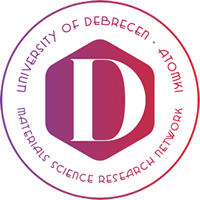
Description of the RI
The Materials Science Departments of the University of Debrecen (UD) and the Institute for Nuclear Research (ATOMKI) have a long history of cooperation spanning several decades. On these foundations, a research-industry cooperation base in materials science has been established and further developed as a research centre of excellence within the framework of a joint GINOP grant. The significant infrastructure development has resulted in the creation of a unique research facility in Eastern Hungary, with a nationally and internationally recognised infrastructure and knowledge base of unique importance, open to researchers, industrial partners and education.
The research groups working here have gained international reputations in the fabrication of thin films, multilayers, nanoparticles, membranes, shape memory alloys and other one-, two- and three-dimensional structures, in the study of their thermal properties and kinetic behaviour (stability, solid-state reactions, diffusion on the nanoscale), optical, optoelectronic, (photo)catalytic and other application-relevant properties. In addition to experimental studies, their activities extend to theoretical and computational modelling, thus completing the spectrum of scientific knowledge.
Through the activities of the partner institutions, a unique, coherent set of instruments has been created in Central-Eastern Europe that enables nanotechnology-level analysis and construction even on the atomic scale. The set of instruments provides a unique opportunity to fabricate and study (nano)structures for research and development purposes. It attracts national and international collaborators as an open access regional centre. Linked to the University of Debrecen, it provides educational functions and offers R&D support to large international companies in the region to solve manufacturing technology problems.
Activities and Services
Our laboratories offer a wide range of thin film deposition options for users, such as magnetron sputtering, thermal and plasma assisted atomic layer deposition (ALD, PE-ALD), evaporation. A range of furnaces provides the possibility to anneal samples under different atmospheres and vacuum (HV, UHV) to study the thermal stability of thin films, layer systems, atomic mobility processes or even the formation dynamics of different phases. Micro- and nanoscale sampling is performed with equipment such as scanning electron microscopes (SEM), one of which is equipped with a focused ion beam machining facility (FIB/SEM), and therefore also suitable for atomic- and nanoscale structure fabrication, a transmission electron microscope (TEM), a Raman microscope combined with an atomic force microscope, a spectroscopic ellipsometer, or a combined instrument capable of analysing samples in a common vacuum system by secondary neutral mass spectrometry (SNMS), X-ray photoelectron spectroscopy (XPS), low energy ion scattering (LEIS) and non-contact atomic force microscopy (nc-AFM). A modern thin-film X-ray facility is also available for structural analysis of samples.
Distributed
University of Debrecen Faculty of Sciences and Technology
Debrecen
Fully operational, 2005-
Atomic Research Institute (ATOMKI)
INTERNATIONAL COLLABORATION
with RIs
- HZB-BESSY (Helmholtz-Zentrum Berlin)
- University of Stuttgart
- University of Rouen Normandy (URN)
- Ain Shams University (ASU)
- Leipzig University
- Interuniversity Microelectronics Center (IMEC)
Zoltán Erdélyi, head of department
zoltan.erdelyi@science.unideb.hu
Attila Csík
csik.attila@atomki.hu







